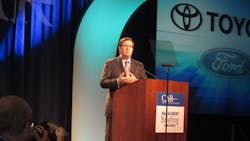Toyota's Lentz Preaches Collaboration as Auto Industry Tackles Tough Challenges
There was a time, Jim Lentz recalled, when Toyota Motor Corp. (IW 1000/5) "used to be the lone wolf," eschewing partnerships in favor of doing things on its own.
But Lentz, president and CEO of Toyota Motor Sales USA Inc., asserted that those days are long gone.
"The challenges we face are far too great to go it alone," Lentz told attendees of the Center for Automotive Research's Management Briefing Seminars in Traverse City, Mich.
Atop the list of challenges facing the industry, Lentz asserted, are the Obama administration's tough new CAFE standards, which call for every automaker's fleet to have a combined average fuel economy of at least 54.5 miles per gallon by 2025.
"It's going to be a huge challenge for all brands to reach these regulations without making big investments in new technologies," Lentz said. "That's where teamwork and collaboration come into play."
Lentz pointed to Toyota's partnership with Ford Motor Co. (IW 1000/16), announced in August 2011, to develop a hybrid system for light trucks and SUVs. He also noted the long-term collaboration between Toyota and BMW AG (IW 1000/37) to develop fuel cells, lightweight materials and other technologies.
In California, where Gov. Edmund Brown earlier this year signed an executive order calling for 1.5 million zero-emission vehicles on the roads by 2025, Toyota is working with Palo Alto, Calif.-based Tesla Motors to launch an all-electric version of Toyota's popular RAV-4 SUV.
"These alliances will help us and our partners move closer to meeting the new fuel standards," Lentz said.
During a panel discussion at the Management Briefing Seminars, Lentz estimated that U.S. consumers in July purchased some 37,000 hybrids and maybe 500 electric vehicles.
Those small numbers, Lentz said, only reinforce his assertion that automakers, suppliers, lawmakers and researchers need to work together to develop cost-effective electric and other alternative-fuel technologies.
"With each of us working independently, there's not enough scale for us to do it where it's feasible from a business standpoint," Lentz said.
Understanding 'Gen Y'
Lentz talked about another huge challenge that automakers will need to get their arms around: Capturing the attention of Generation Y, also known as millennials.
Lentz estimated that 80 million people fall into the category of Gen Y -- those born between the late 1970s and the late 1990s, by some definitions -- making it "the largest consumer segment to hit the market since the baby boomers."
"And while boomers saw automobiles as their ticket to freedom and self-reliance, Gen Y seems lukewarm, at best, about cars," Lentz said.
The demographics of Gen Y are working against the industry. For one thing, millennials are clustered in urban areas, where they can take advantage of mass transit, car sharing and other transportation options "that we as boomers really didn't look at."
Adding to the challenge, Lentz noted, is the fact that Gen Y is coming of age in a lousy economy, and coming out of college with a much larger debt load than previous generations.
"It's not uncommon for them to have $400- and $500-a-month [student-loan] payments that they'll be paying for years into the future," Lentz said. "That's a car payment."
Gen Y consumers' tastes don't exactly fall into the auto industry's sweet spot. They prefer fuel-efficient, environmentally friendly vehicles that, as Lentz put it, are "stylish and fun to drive, easy on their pocket books and loaded with advanced technologies to keep them safely connected."
He pointed to research indicating that nearly three out of five Gen Y consumers favor hybrids over conventional powertrains.
"Yes, that's a tall order," Lentz said. "But [it's] doable if we leverage teamwork throughout the industry."
What's promising, Lentz added, is that a recent report concluded that millennials are returning to the market.
"Their life stage is changing," Lentz said during the panel discussion. "They're getting their first jobs, they're getting married, they're having families.
"I'm not concerned that this is a huge generation that is going to turn against the automobile. I think they will definitely be there. They just may consume vehicles a little differently than we did as boomers."
About the Author
Josh Cable
Former Senior Editor
Former Senior Editor Josh Cable covered innovation issues -- including trends and best practices in R&D, process improvement and product development. He also reported on the best practices of the most successful companies and executives in the world of transportation manufacturing, which encompasses the aerospace, automotive, rail and shipbuilding sectors.
Josh also led the IndustryWeek Manufacturing Hall of Fame, IW’s annual tribute to the most influential executives and thought leaders in U.S. manufacturing history.
Before joining IndustryWeek, Josh was the editor-in-chief of Penton Media’s Government Product News and Government Procurement. He also was an award-winning beat reporter for several small newspapers in Northeast Ohio.
Josh received his BFA in creative writing from Bowling Green University, and continued his professional development through course-work at Ohio University and Cuyahoga Community College.
A lifelong resident of the Buckeye State, Josh currently lives in the Tremont neighborhood of Cleveland. When the weather cooperates, you’ll find him riding his bike to work, exercising his green thumb in the backyard or playing ultimate Frisbee.
